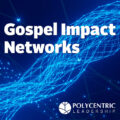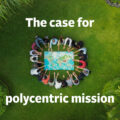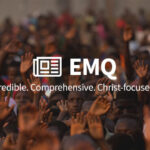GUEST POST BY JIM MEMORY
In missiology, the study of Christian mission, our attempts at understanding the advance and retreat of Christianity through history and in the present day frequently involve the creation of categories and concepts that help us make sense of the complexities of the reality ‘on the ground’. We frame the data into a certain narrative; we identify models and persons who played an exemplary role (whether positive or negative); we highlight significant places and events; and we rethink our mission theology and practice in the light of what we observe.
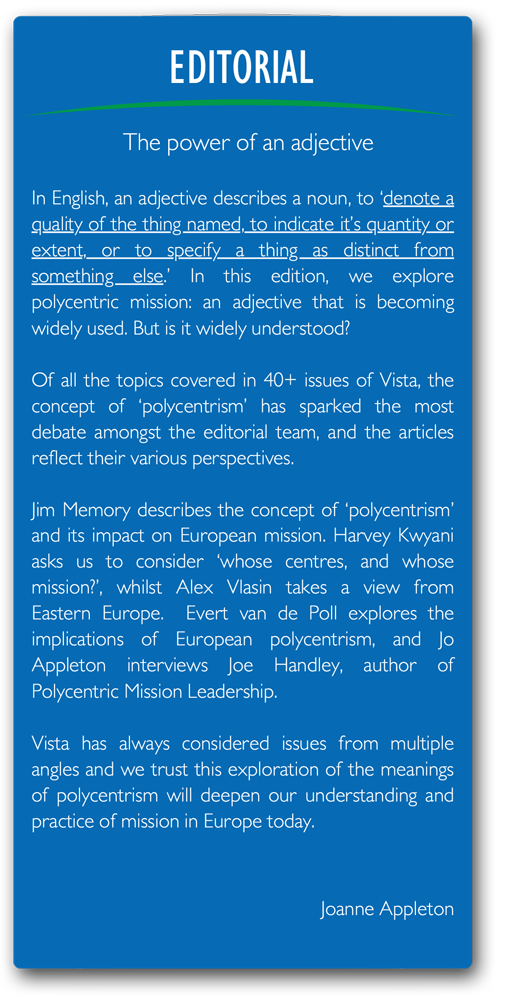 We also create new labels (neologisms) to consolidate this knowledge and communicate it to others. In this respect, a new word has emerged in recent missiological studies to describe one of the features of the spread of Christianity in today’s world: polycentric. Whilst not as ubiquitous as the word “missional” which we critiqued in a previous edition of Vista (Issue 13, 2013), the terms polycentric mission and polycentric leadership have been popularised by a number of authors (Yeh, Franklin, Handley), and have featured as the theme of conferences such as the 2016 Global Mission Consultation of the World Evangelical Alliance: Polycentric Mission – From all nations to all nations.
We also create new labels (neologisms) to consolidate this knowledge and communicate it to others. In this respect, a new word has emerged in recent missiological studies to describe one of the features of the spread of Christianity in today’s world: polycentric. Whilst not as ubiquitous as the word “missional” which we critiqued in a previous edition of Vista (Issue 13, 2013), the terms polycentric mission and polycentric leadership have been popularised by a number of authors (Yeh, Franklin, Handley), and have featured as the theme of conferences such as the 2016 Global Mission Consultation of the World Evangelical Alliance: Polycentric Mission – From all nations to all nations.
This article, and by extension the whole of this issue of Vista, seeks to explore the meaning and use of the word polycentric in Christian mission studies today and, more specifically, consider its implications for mission in Europe.
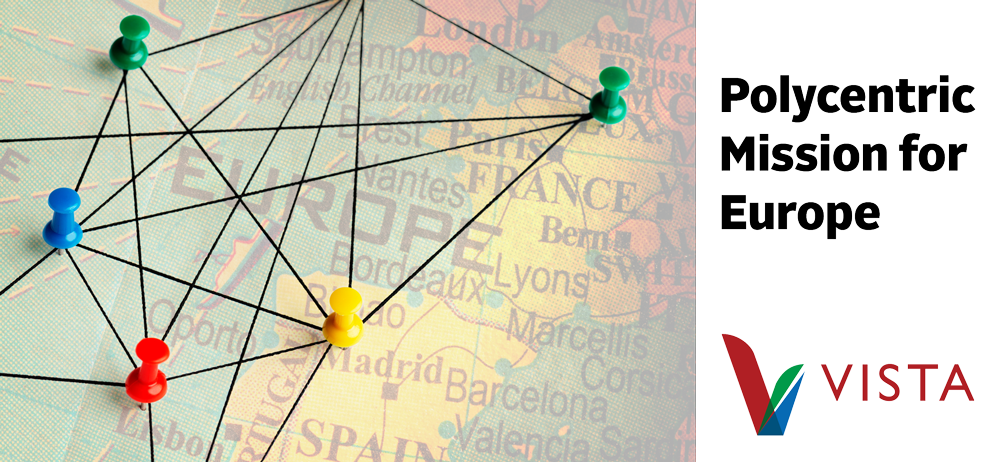
Polycentric Approaches are Everywhere
Polycentricity is not a concept limited to mission studies. Graham Hill’s definition, and his review of the breadth of domains in which polycentrism has become influential (business, politics, governance, leadership, and urban development to name just a few), is really helpful as a starting point:
Emerging from the Greek term meaning “multiple centers,” polycentricity stands as a pivotal construct spanning diverse disciplines. The principle embodies systems populated by numerous autonomous yet symbiotic decision-making entities. 1
When it comes to mission studies, the definition has a more precise referent:
In 1910, missions was “From the West to the Rest”. In the twenty-first century, missions is “From Everywhere to Everywhere” because, instead of being unidirectional, it is polycentric and polydirectional.2
This quote from Allen Yeh neatly provides both a definition and a narrative. Christian mission no longer has a single centre of power nor a single trajectory of transmission. This description of our contemporary missiological reality is undoubtedly true. Yet a closer interrogation of Yeh’s statement reveals a bias that must also be challenged.
The Myth of Unidirectional Mission
Klaus Koschorke and the “Munich School of World Christianity”, a research centre which has critiqued Eurocentric perspectives of the history of Christianity, has provided a wealth of literature to demonstrate that “the history of world Christianity is characterized by polycentric structures, not just over the last two centuries but already from its very beginning.”3
There has always been a plurality of church structures, cultural expressions, confessional variations, and indigenous initiatives. The idea that polycentric mission is a new reality, that there ever was a time when a single centre had hegemony over the task of Christian mission, is a myth.

“That together we might all
participate in the polycentric
mission of God.”
Moreover, the Munich School’s research “suggests that we understand the history of world Christianity as a history of multidirectional transcontinental interactions by focusing especially on transregional and transcontinental links between Christian movements and churches in different parts of the world.”4 Our increasing global connectedness is facilitating transcontinental interactions between churches in different continents but these interactions are not qualitatively different from those that existed in previous centuries.
The Rise of World Christianity
Yeh’s questionable affirmation about the emergence of polycentric mission does reveal a truth however from the perspective of the church in the West, that the phenomenon of World Christianity is a seismic reorientation. The shift in the demographic centre of gravity of Christianity to the Majority World as first noted by Andrew Walls, has huge implications. The emergence of countless books, journals, and institutions with “World Christianity” in their titles is evidence of this paradigm shift. This de-centering of Christianity from its 19th Century strongholds in Europe and North America to new centres in the Majority World, may not be completely new but it is only recently that Europeans and North Americans have become conscious of it. As Frederiks has observed:
The postulated but frequently implicit background to this conceptualization of World Christianity seems to be a representation of European Christianity as a tale of secularisation and decline. Against this context, the construct ‘World Christianity’ seems to function as a discursive reassurance that due to the “meteoric rise of non-Western Christianity” (both in loci and in its migration settings) there is hope for the Christian faith after all.5
The arrival of millions of Majority World Christians into Europe in the last fifty years has changed the face of the European church. It is a reason for hope. Yet as Friedriks observes, discourses of World Christianity often obscure the stories of Christian resilience and revival amongst indigenous Europeans.
Europe in the 21st Century may be more of a mission frontier than a mission stronghold but that is not a reason to ignore the voice of the European church. On the contrary, as churches in other parts of the world face the challenges of secularisation in the decades to come, the experience of the European church may be vital.
Furthermore, as legitimate postcolonial critiques highlight the failings of European mission endeavours in the past and present, this de-centering of Christianity must not so disempower the European church that its place in world mission is marginalised. We do not become more polycentric if all we do is to replace old centres of power with new ones.
The Polycentric Perspective
The polycentric perspective acknowledges and values the wisdom and potential of all those engaged in mission around the world and looks for opportunities to work together. It is sensitive to marginalised and muted voices and seeks out ways of bringing their insights into the conversation and into the implementation of initiatives.
Handley considered the implications of this perspective for mission leadership and found, on the basis of his research, “that polycentrism offers a stronger model for effective mission leadership in the world today” and concluded thus:
Giving freedom to each leader, region, and country to make decisions in their own settings allows the adaptive and creative energy to flow based on the local context and situation. … As mission leaders empower the various centers of gravity in their networks and organizations, deeper levels of ownership are fostered, leading to greater unity in the diversity and effectiveness in mission.6
Implications for Europe
1. Recognition of polycentric mission in Europe
The polycentric perspective recognises and values the breadth of potential and wisdom across the whole of Europe. Too often the dominant voices (predominantly in Northern and Western Europe) drown out Central and Eastern European perspectives and stories. Our privileging of English over the thirty other indigenous languages of Europe is one of the main causes of this. Our understanding and appreciation of what God is doing across Europe suffers as a consequence.
2. Attention to marginalised and muted voices
The polycentric perspective is not only about sensitivity to geography and language. There are muted or marginalised voices in many of our countries, something that we have already explored in Vista 24 and 33, finding that the voice of women, the young, and many diaspora churches in Europe, are rarely heard in our mission consultations. We are simply not listening to all that “the Spirit is saying to the churches” (Revelation 2:29).
3. Appreciation of transcontinental and transnational connections
The polycentric perspective celebrates the multidirectional interactions between countries and continents. These connections have always been a vital part of Christian mission, yet they are rarely celebrated in national churches. Transnational networks like European Evangelical Alliance, Lausanne Europe, European Leadership Forum, Revive Europe, as well as the transnational connections within denominational families like the Pentecostal European Fellowship, European Baptist Federation, and so on, are tremendously influential and have really come into their own in facilitating responses to the Ukraine Crisis. Transcontinental connections must also be facilitated more actively.
4. Fostering of collaboration between all Europe’s mission actors
The polycentric perspective challenges us to expect collaboration and seek it out where it is not yet happening. The presence of millions of Majority World Christians in Europe is not having the impact it might because diaspora church leaders and native European church leaders rarely collaborate together intentionally. Yes, there are multicultural churches and intercultural initiatives in many places, but this should be the expectation of all God’s people in Europe. Mission in a polycentric world necessarily implies collaboration.
5. Affirmation of the enduring voice of the European church in the global conversation
The polycentric perspective encourages European Christians to play their full part in the Mission of God. Yes, “the centre of gravity of the global church has moved South”, but the experience and resources of the European churches is considerable. Yes, we do need to repent for the evils of mission during the colonial times and for our arrogance towards the Majority World in the present, but the answer is not to be silent and to “down tools”. The polycentric perspective invites us to consider what we have to contribute and to offer it to the global church in humble service.
Epilogue: Lausanne 1974
When evangelicals came together in the Swiss city of Lausanne for the International Congress on World Evangelization in July 1974, it quickly became apparent to those behind the scenes that there was a serious disagreement. The church growth school of North American academics from Fuller Theological Seminary (McGavran, Winter, Wagner and Glasser) were being challenged by a minority voice from the Majority World (Padilla and Escobar). “Escobar and Padilla criticized the church growth theory for transforming mission into a marketing strategy. And they insisted on lifting high the social responsibility of Christians and of churches.”7
It is difficult to imagine that the Lausanne Covenant would have had anything like the impact that it did around the globe without John Stott’s inclusion of Article 5 on “Christian Social Responsibility” as a direct result of those conversations. This is the polycentric perspective in microcosm: the recognition and valuing of other perspectives and voices, and the bringing of those ideas and voices into synthesis.
Polycentric mission may be a new expression, but it codifies a truth that has characterised the church of Jesus Christ since its beginning: “God has placed the parts in the body, every one of them, just as he wanted them to be. If they were all one part, where would the body be? As it is, there are many parts, but one body.” (1 Corinthians 12:18-20)
May we give our bodies, our hands and feet, our ears and voices, to play our part in God’s mission. But let us also welcome the hands and feet, ears and voices of others, in our nation, across our continent, and around the world, that together we might all participate in the polycentric mission of God.
Jim Memory
End Notes
1 Hill, Polycentric Mission and Ministry – “From Everyone to Everywhere”, https://grahamjosephhill.com/polycentric-mission/
2 Yeh (2016), Polycentric Missiology, Downers Grove: IVP, p.216
3 Hermann and Burlacioiu (2016), Journal of World Christianity, 6 (1), p.64
4 Ibid.
5 Frederiks (2021), “World Christianity: Contours of an Approach”, in Fredericks and Nagy (Eds.), World Christianity: Methodological Considerations, Leiden: Brill, p.13
6 Handley (2022), Polycentric Mission Leadership, Oxford: Regnum, p.71
7 Melhus (2014), “To Tell the Whole World”, in Dahle et al. (Eds.), The Lausanne Movement: A Range of Perspectives, Oxford: Regnum, p.93,94
This article was first published by European Mission [https://www.europeanmission.redcliffe.ac.uk] on November 1, 2023 here and was reposted with permission.
About Vista

Vista has been communicating research and innovation about mission in Europe since 2010.
Vista is committed to understanding the changing nature of mission and Christian faith in continent of Europe; a continent where Christian faith, social trends, religious expressions, and shifting cultural realities, are all in constant flux. With its information-led approach to comment and analysis, Vista continues to pay close attention to the implications for Christian mission of the interconnected nature of social, political, religious, and cultural trends. Vista strives to stimulate mission reflection and practice among thoughtful mission and ministry leaders who are open to research that opens windows into the experiences of others. Vista’s essential vision for Europe is established upon roots that extend deeply into the evangelical tradition, rather than upon walls that separate us from others. (https://www.europeanmission.redcliffe.ac.uk/)




